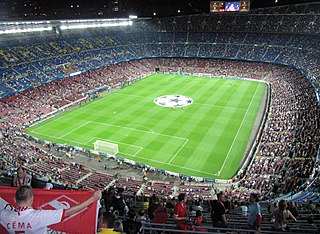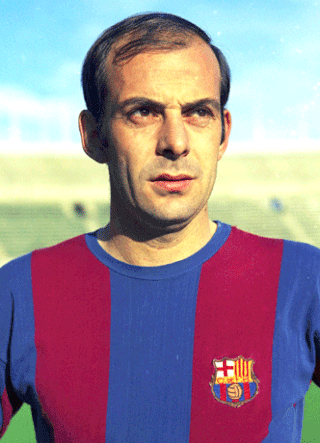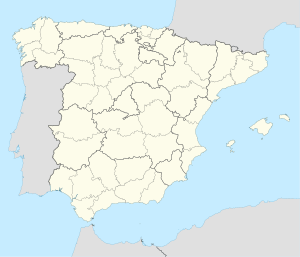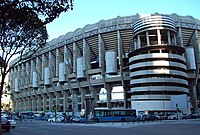
The 1982 FIFA World Cup was the 12th FIFA World Cup, a quadrennial football tournament for men's senior national teams, and was played in Spain from 13 June to 11 July 1982. The tournament was won by Italy, who defeated West Germany 3–1 in the final held in the Santiago Bernabéu Stadium in the capital, Madrid. It was Italy's third World Cup title, but their first since 1938. The defending champions, Argentina, were eliminated in the second round. Algeria, Cameroon, Honduras, Kuwait and New Zealand made their first appearances in the finals.

The 1988–89 European Cup was the 34th season of the European Cup football club tournament. The competition was won by Milan, the first time since 1969 and third time overall, comfortably defeated former winners Steaua București in the final.

Jesús María Pereda Ruiz de Temiño, also known as Chus Pereda, was a Spanish football midfielder and manager.

Amancio Amaro Varela, commonly known simply as Amancio, was a Spanish football player. Nicknamed El Brujo he played outside right for Deportivo de La Coruña, Real Madrid, and the Spain national team.

The 1964 European Nations' Cup final was a football match at the Santiago Bernabéu Stadium, Madrid, on 21 June 1964, to determine the winner of the 1964 European Nations' Cup. It was the second final of what has since been the UEFA European Championship, UEFA's quadrennial football competition for national teams. The match was contested by Spain and the previous tournament winners, the Soviet Union. En route to the final, Spain defeated Romania, Northern Ireland, and the Republic of Ireland over two-legged ties before beating Hungary in the semi-final. The Soviet Union received a bye in the qualifying round before beating Italy, Sweden, and Denmark en route to the final.
The knockout phase of the 2009–10 UEFA Champions League began on 16 February and concluded on 22 May 2010 with the final won by Internazionale against Bayern Munich 2–0 at the Santiago Bernabéu Stadium in Madrid. The knockout phase involved the sixteen teams who finished in the top two in each of their groups in the group stage.
The knockout stage of the 2002–03 UEFA Champions League ran from 8 April 2003 until the final at the Old Trafford in Manchester, England on 28 May 2003. The knockout stage involved the eight teams who finished in the top two in each of their groups in the second group stage.
The knockout phase of the 2010–11 UEFA Champions League began on 15 February and concluded on 28 May 2011 with the final at Wembley Stadium in London, England. The knockout phase involved the 16 teams who finished in the top two in each of their groups in the group stage.
The 1999–2000 UEFA Champions League second group stage matches took place between 23 November 1999 and 22 March 2000. The second group stage featured the eight group winners and eight group runners-up from the first group stage. Each team was drawn into one of four groups, each of which featured three other clubs. All four teams in the group played home and away matches against each other to determine the winner and runner-up in the group.
The knockout phase of the 2011–12 UEFA Champions League began on 14 February with the round of 16, and concluded on 19 May 2012 with the final at Allianz Arena in Munich, Germany.
The knockout phase of the 2012–13 UEFA Champions League began on 12 February and concluded on 25 May 2013 with the final at Wembley Stadium in London, England.
The knockout stage of the 1998–99 UEFA Champions League began on 3 March 1999, and ended with the final at the Camp Nou in Barcelona on 26 May 1999. The six group winners in the group stage, as well as the two best runners-up, competed in the knockout stage. For the quarter-finals, two group winners were randomly drawn against the two best runners-up from another group while the other four group winners face each other with the restriction that the two best runners-up cannot be drawn against the winners of their own group. The four quarter-final winners were then drawn together for the semi-finals, the winners of which contested the final.
The knockout stage of the 1999–2000 UEFA Champions League began on 4 April 2000 and ended with the final at the Stade de France in Saint-Denis on 24 May 2000. The top two teams from each of the four groups in the second group stage competed in the knockout stage. For the quarter-finals, each group winner was randomly drawn against the runner-up from another group, with the group winner hosting the second leg. The four quarter-final winners were then drawn together for the semi-finals, the winners of which contested the final.
The 2014–15 UEFA Champions League knockout phase began on 17 February and concluded on 6 June 2015 with the final at Olympiastadion in Berlin, Germany to decide the champions of the 2014–15 UEFA Champions League. A total of 16 teams competed in the knockout phase.
The 2015–16 UEFA Champions League knockout phase began on 16 February and concluded on 28 May 2016 with the final at San Siro in Milan, Italy, to decide the champions of the 2015–16 UEFA Champions League. A total of 16 teams competed in the knockout phase.
The 2016–17 UEFA Champions League knockout phase began on 14 February and ended on 3 June 2017 with the final at Millennium Stadium in Cardiff, Wales, to decide the champions of the 2016–17 UEFA Champions League. A total of 16 teams competed in the knockout phase.
The UEFA Euro 1968 quarter-finals was the last round of qualifying competition for UEFA Euro 1968. It was contested by the eight group winners of the qualifying tournament. The winners of each of four home-and-away ties qualified for the final tournament in Italy. The matches were played in April and May 1968.
The final tournament of the 1964 European Nations' Cup was a single-elimination tournament involving the four teams that qualified from the quarter-finals. There were two rounds of matches: a semi-final stage leading to the final to decide the champions. The final tournament began with the semi-finals on 17 June and ended with the final on 21 June at the Santiago Bernabéu in Madrid. Spain won the tournament with a 2–1 victory over the Soviet Union.
The 2017–18 UEFA Champions League knockout phase began on 13 February and ended on 26 May 2018 with the final at the NSC Olimpiyskiy Stadium in Kyiv, Ukraine, to decide the champions of the 2017–18 UEFA Champions League. A total of 16 teams competed in the knockout phase.
The 2018–19 UEFA Champions League knockout phase began on 12 February and ended on 1 June 2019 with the final at the Metropolitano Stadium in Madrid, Spain, to decide the champions of the 2018–19 UEFA Champions League. A total of 16 teams competed in the knockout phase.









